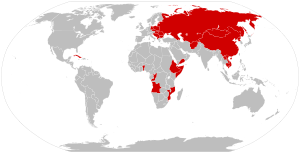Nhà nước cộng sản

| Một phần trong loạt bài về |
| Chủ nghĩa cộng sản |
|---|
 |
|
|
Nhà nước cộng sản (tiếng Anh: Communist state hay Marxist–Leninist state, workers' state) là nhà nước được quản lý bởi một đảng, theo Chủ nghĩa Marx–Lenin, với hướng tiến lên chủ nghĩa cộng sản.[cần dẫn nguồn]
Có một số trường hợp nhà nước cộng sản hoạt động kết hợp với các tổ chức phi chính trị như công đoàn, ủy ban thường trực hay dân chủ trực tiếp.[1][2][3][4][5] Thuật ngữ "nhà nước cộng sản" được các sử gia, nhà nghiên cứu và truyền thông phương Tây sử dụng. Tuy nhiên, trái ngược với phương Tây, các quốc gia cộng sản này không sử dụng thuật ngữ đó mà tự gọi mình là một hệ thống xã hội chủ nghĩa đang trong quá trình xây dựng chủ nghĩa xã hội.[6][7][8][9]
Nhà nước cộng sản thông thường chỉ được quản lý bởi một đảng với bộ máy chính quyền của nó, các đảng phái khác có thể cùng tồn tại trong nhà nước đó, nhưng chúng bị kiểm soát bởi đảng chủ chốt. Các đảng chủ chốt ở đây thường là theo chủ nghĩa Mác - Lênin (hoặc đôi khi là tư tưởng Mao Trạch Đông ở Trung Quốc), với mục tiêu là đi lên chủ nghĩa xã hội. Nhà nước cộng sản được chủ nghĩa Marx coi là nền chuyên chính vô sản của giai cấp công nhân, nơi mà giai cấp này làm chủ. Đối ngược lại với đó là chủ nghĩa tư bản, nơi giai cấp tư sản nắm quyền quyết định.
Tham khảo
[sửa | sửa mã nguồn]- ^ Sloan, Pat (1937). “Soviet democracy”. Truy cập ngày 11 tháng 6 năm 2023.
- ^ Farber, Samuel (1992). “Before Stalinism: The Rise and Fall of Soviet Democracy”. Truy cập 11 tháng 6 năm 2023.
- ^ Getzler, Israel (2002). “Kronstadt 1917-1921: The Fate of a Soviet Democracy”. Cambridge University Press. Truy cập ngày 19 tháng 7 năm 2016.
- ^ Webb, Sidney; Beatrice Webb (1935). “Soviet communism: a new civilisation?”. Truy cập ngày 19 tháng 7 năm 2016.
- ^ Busky, Donald F. (ngày 20 tháng 7 năm 2000). Democratic Socialism: A Global Survey. Praeger. tr. 9. ISBN 978-0275968861.
In a modern sense of the word, communism refers to the ideology of Marxism-Leninism.
- ^ Wilczynski, J. (2008). The Economics of Socialism after World War Two: 1945-1990. Aldine Transaction. tr. 21. ISBN 978-0202362281.
Contrary to Western usage, these countries describe themselves as 'Socialist' (not 'Communist'). The second stage (Marx's 'higher phase'), or 'Communism' is to be marked by an age of plenty, distribution according to needs (not work), the absence of money and the market mechanism, the disappearance of the last vestiges of capitalism and the ultimate 'whithering away' of the State.
- ^ Steele, David Ramsay (tháng 9 năm 1999). From Marx to Mises: Post Capitalist Society and the Challenge of Economic Calculation. Open Court. tr. 45. ISBN 978-0875484495.
Among Western journalists the term 'Communist' came to refer exclusively to regimes and movements associated with the Communist International and its offspring: regimes which insisted that they were not communist but socialist, and movements which were barely communist in any sense at all.
- ^ Rosser, Mariana V. and J Barkley Jr. (ngày 23 tháng 7 năm 2003). Comparative Economics in a Transforming World Economy. MIT Press. tr. 14. ISBN 978-0262182348.
Ironically, the ideological father of communism, Karl Marx, claimed that communism entailed the withering away of the state. The dictatorship of the proletariat was to be a strictly temporary phenomenon. Well aware of this, the Soviet Communists never claimed to have achieved communism, always labeling their own system socialist rather than communist and viewing their system as in transition to communism.
- ^ Williams, Raymond (1983). “Socialism”. Keywords: A vocabulary of culture and society, revised edition. Oxford University Press. tr. 289. ISBN 0-19-520469-7.
The decisive distinction between socialist and communist, as in one sense these terms are now ordinarily used, came with the renaming, in 1918, of the Russian Social-Democratic Labour Party (Bolsheviks) as the All-Russian Communist Party (Bolsheviks). From that time on, a distinction of socialist from communist, often with supporting definitions such as social democrat or democratic socialist, became widely current, although it is significant that all communist parties, in line with earlier usage, continued to describe themselves as socialist and dedicated to socialism.
Liên kết ngoài
[sửa | sửa mã nguồn] GIẢM
-50%
GIẢM
-50%
 GIẢM
30%
GIẢM
30%
 GIẢM
24%
GIẢM
24%
 GIẢM
17%
GIẢM
17%
 GIẢM
32%
GIẢM
32%
 GIẢM
24%
GIẢM
24%



